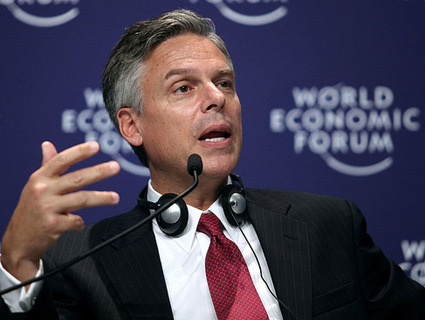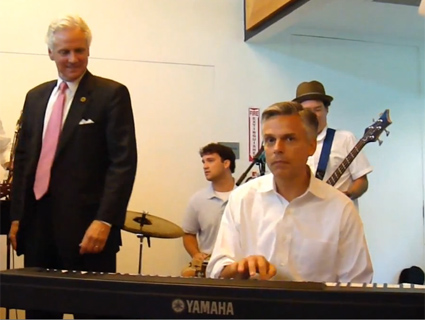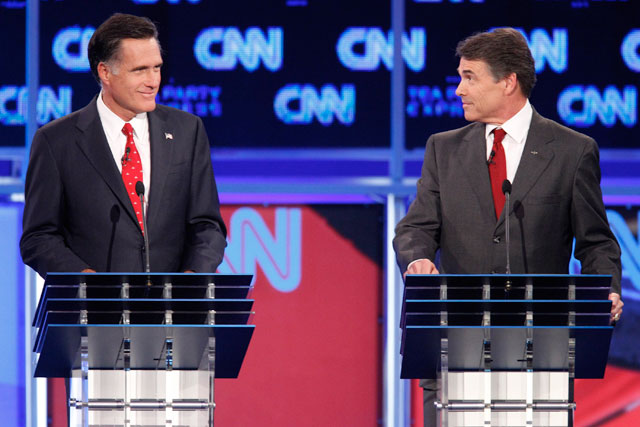 Edmund D. Fountain/St. Petersburg Times/Zuma
Edmund D. Fountain/St. Petersburg Times/Zuma
If you watched Monday Night Football you missed CNN’s tea party debate in Tampa, Florida. Or perhaps you flipped between channels like our own Adam Weinstein. In either case, read on for the MoJo News Team’s instant analysis of the debate.
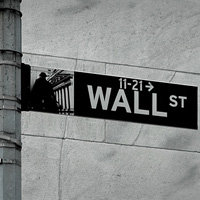 Matthew Knott/Flickr
Matthew Knott/Flickr
Rick Perry: Let’s “Free Up” Wall Street—Because That Worked in 2008
—By Andy Kroll
At Monday’s CNN/Tea Party Express debate, Texas Gov. Rick Perry, the GOP presidential front-runner, claimed that it was important to “free up” Wall Street in order to create jobs and grow the US economy. This is a common talking point for Perry, who last month said the government needs to “free” the “Wall Street investor from the overregulation and the overtaxation.”
Talk about a case of amnesia. Let’s not forget, it was all those “freed,” underregulated banks, mortgage companies, and investment firms that imploded the economy. Years of deregulatory policy under Democratic and Republican presidents—including tearing down the Glass-Steagall Act in 1999, which walled off commercial banking from more risky investments and speculation, and passing the Commodity Futures Modernization Act in 2000, which essentially transformed Wall Street into a casino—helped bring the financial markets to their knees in 2008.
The bipartisan Financial Crisis Inquiry Commission (FCIC) (PDF) pointed deregulation as a key reason for the meltdown:
We conclude widespread failures in financial regulation and supervision proved devastating to the stability of the nation’s financial markets. The sentries were not at their posts, in no small part due to the widely accepted faith in the self-correcting nature of the markets and the ability of financial institutions to effectively police themselves. More than 30 years of deregulation and reliance on self-regulation by financial institutions, championed by former Federal Reserve chairman Alan Greenspan and others, supported by successive administrations and Congresses, and actively pushed by the powerful financial industry at every turn, had stripped away key safeguards, which could have helped avoid catastrophe. This approach had opened up gaps in oversight of critical areas with trillions of dollars at risk, such as the shadow banking system and over-the-counter derivatives markets. In addition, the government permitted financial firms to pick their preferred regulators in what became a race to the weakest supervisor.
“Freeing” up Wall Street is the same thinking that led to the crisis, and it’s not surprising Perry would say this, given that an ally of his, former US Sen. Phil Gramm (R-Texas), was an architect of Wall Street deregulation in the 1990s. If anything, the FCIC suggests, Wall Street needs more regulation—more sentries, more cops on the beat, more safeguards—not fewer. That was the aim of the Dodd-Frank financial reform bill, which many of the GOP presidential candidates say they want to repeal.
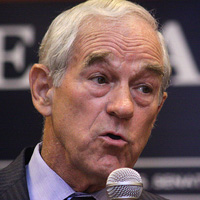 Gage Skidmore/Flickr
Gage Skidmore/Flickr
Ron Paul: Mitt Romney’s Unlikely Secret Weapon
If you watched Monday’s the CNN/tea party debate, you could be forgiven for asking what the septuagenarian Texas congressman Ron Paul has against his home state governor, Rick Perry. It’s pretty simple, actually. Paul is channeling the same grievances that tea partiers in Texas have attacked Perry with for years. Specifically, that his executive order mandating the Gardasil HPV vaccine for adolescent girls was an invasive power grab by big government; that he increased spending over his decade as governor; that he’s raised the state’s level of debt; and that he’s raised taxes (Paul says he’s experienced this firsthand).
If this sounds familiar, it’s because this is the same line of attack that was launched against Perry in 2010 by Debra Medina, the nurse and former county GOP chair who finished a surprising third in the Texas gubernatorial primary. (I previewed this line of attack back in August.) There’s more there that Paul likely believes but neglected to mention (the much-maligned Trans-Texas Corridor, which he and others viewed as a harbinger for a future North American Union, for instance.) And it’s not the first time; if anything, it was just a more substantive reprise of the back-and-forth between Perry and Paul at last week‘s debate, which culminated in this photo.
Paul won’t win the Republican nomination. But Romney might, and if he does, he’ll have Paul to thank (at least in part). That’s because Paul is able to make the case that Perry is really just a Big Government wolf in sheep’s clothing with a level of credibility that pretty much no one else has. Tea partiers, which is to say the conservative base, don’t really gravitate naturally toward Romney. Paul’s attacks make the gap between him and Perry seem that much smaller.
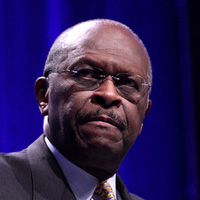 Gage Skidmore/Flickr
Gage Skidmore/Flickr
Herman Cain’s Chilean Model, Explained
For the second consecutive Republican president debate, pizza mogul and talk radio host Herman Cain has suggested the “Chilean Model” as a way to fix Social Security. Never mind that it’s Medicare, not Social Security, whose runaway costs pose a long-term threat to the nation’s fiscal health—what the heck is the Chilean Model? And do we want it?
As it happens, we’ve been down this path before. It was 2005, and then-President Bush was floating a proposal to privatize Social Security—to ensure, he explained, that it would still be there for future generations. Bush turned to the Chilean model, which itself was a product of the Chicago School of Economics, brought to South America by economist Milton Friedman. Here’s how Barbara Dreyfuss explained it in a MoJo piece that year:
With labor’s political power in check, [former labor minister José] Piñera focused on privatizing the pension system. He saw as his biggest obstacle the “tenacious belief that Social Security could and should be an effective vehicle for the redistribution of wealth.” The new system, adopted in 1981, required all new workers to sign up for private pension accounts and offered financial incentives for those in the public retirement system to switch.
The transition was expensive and funded by slashing government programs, selling off state-owned industries, selling bonds to the new pension funds, and raising taxes. Privatization costs, which also included a government subsidy for workers unable to accumulate enough in their private accounts to guarantee a minimum income in retirement, averaged more than 6 percent of Chile’s gross domestic product in the 1980s and are expected to average more than 4 percent of GDP each year until 2037.
But while the reform’s supporters argue it has been a major success story, officials both inside and outside Chile now increasingly question whether the high costs and modest investment returns have doomed Piñera’s original promise: a decent retirement income for workers at a savings for the government. Last year, the World Bank, which until recently encouraged countries to privatize pensions, published a highly skeptical report on private retirement systems in Latin America; Truman Packard, one of the report’s authors, says the bank has told the Chilean government that it must spend more to subsidize the private system and “increase its role in preventing old-age poverty.”
The full piece is worth your time. Check it out.
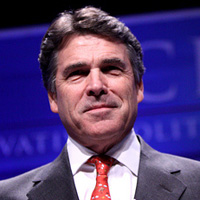 Gage Skidmore/Flickr
Gage Skidmore/Flickr
Rick Perry’s Price is Actually Closer to $25,000
One of the more riveting (yes, riveting) exchanges during Monday’s GOP presidential debate came when Texas Gov. Rick Perry was pressed on his decision to issue an executive order mandating that all adolescent girls in the state be vaccinated for HPV. Reps. Michele Bachmann (R-Minn.) and Ron Paul (R-Texas) took shots at Perry for infringing on the liberties of parents and children (Bachmann chillingly called it a “government injection through executive order”). But the most damaging aspect of Perry’s decision was that it reeked of crony capitalism—he had just received a $5,000 campaign contribution from Merck, the company that produced the vaccine, and his former chief of staff, Mike Toomey, was an Austin lobbyist for the company; Toomey is currently running a pro-Perry super-PAC with the stated goal of raising $55 million during the primary.
Bachmann took a pass on the lobbying angle last week, but she broached the issue on Monday. And Perry had a response ready for her: “If you’re saying I can be bought for $5,000, I’m offended.”
Boom. So what is Rick Perry’s price? If the past is any indication, it’s closer to $25,000. That number’s not random; it comes from Perry himself. In one of the few controversies of his career as lieutenant governor, he received a black eye in 2000 when it was revealed that he was not-so-subtly baiting top Austin lobbyists into donating big bucks to his campaign war chest. As Texas Monthly explained it:
First, an embarrassing e-mail came to light. Written last year by Dallas insurance executive Robert Reinarz, it claimed that lobbyist Bradley Bryan had persuaded Perry not to appoint a Senate committee to study insurance deregulation in exchange for a $25,000 campaign contribution from the industry. Insurance deregulation was not among the studies ordered by Perry during the interlude between legislative sessions, and according to the Dallas Morning News, Perry did receive $19,000 from insurance interests at a fundraiser held shortly after the e-mail was sent. Perry insists that there was no link between the contributions and his failure to order a study on insurance deregulation, and Bryan told the News that he had never spoken to Perry about the issue…
Next came the controversial fundraising letter. The mailing to lobbyists contained an invitation to a September reception with an attachment listing each lobbyist’s clients, with suggested donation levels up to $25,000. While it is common for lobbyists to be asked to round up contributions—it’s the price of doing business at the Capitol—the actual checks usually come from clients. Fundraising quotas are not unheard of, but they are rarely written down. To lobbyists, the letter seemed to say, I know who your clients are, and if they don’t come up with the big bucks, I’m holding you responsible.
Perry’s explanation is that he merely hoped to determine who was really responsible for the contributions so that he could thank them properly. After his last fund-raiser, he says, he received complaints from people who felt that they had not been properly thanked. Even Perry’s friends in the lobby felt that the letter had been poorly executed. Mike Toomey, a Perry confidant who represents an HMO and a tort-reform alliance, among many other interest groups, approved the idea of the letter in advance but now concedes, “In the intervening time, after the insurance e-mail and the DPS video, some of Perry’s people should have looked at the fundraising letter and asked themselves if anything had changed.”
GOP Crowd Cheers Dying Uninsured Man, Ben Bernanke Treason Claim
—By Andy Kroll
The non sequiturs and talking points dished out by the GOP presidential candidates in Monday night’s CNN/Tea Party Express debate were as perplexing as they were frequent. But almost as bizarre were some of the reactions from the tea-party-heavy crowd in attendance. Consider two incidents from tonight’s debate.
The first one came when CNN’s Wolf Blitzer asked Rep. Ron Paul about a hypothetical situation involving a sick, 30-year-old man without health insurance. Here’s the exchange, with video afterward:
Blitzer: Let me ask you this hypothetical question. A healthy, 30-year-old man has a good job, makes a good living, but decides, “You know what, I’m not going to spend $200 or $300 a month for health insurance because I’m healthy; I don’t need it.” Something terrible happens, all of a sudden he needs it. Who’s going to pay if he goes into a coma, for example?
Paul: In a society that you accept welfare-ism and socialism, he expects the government to take care of it.
Blitzer: Well, what do you want?
Paul: He should do whatever he wants to do, and assume responsibility for himself. My advice to him would be have a major medical policy. But not forced—
Blitzer: But he doesn’t have that. And he needs intensive care for six months. Who pays?
Paul: That’s what freedom is all about. Taking your own risks. This whole idea that you have to prepare to take care of everybody.
Blitzer: But congressman, are you saying that society should just let him die?
Crowd: [Yeah! Yeah! Laughs.]
“Society should just let him die.” Cheers. Wow.
Then there was this exchange, a bit earlier in the night, concerning Rick Perry’s comments that Federal Reserve chairman Ben Bernanke had engaged in treason:
Blitzer: You stand by those remarks, Governor?
Perry: I said that if you are allowing the Federal Reserve to be used for political purposes that it would be almost treasonous. I think that is a very clear statement of fact.
Crowd: [Loud cheers, clapping.]
This is the second GOP debate in a row where the audience has cheered at strange, if not disturbing, moments. Remember that during last week’s NBC News-Politico debate, the crowd burst into applause at hearing that the Perry administration had executed 234 death row inmates, more than any other governor. The New Yorker‘s Amy Davidson put it best in describing how troubling this is:
Is “justice” some sort of slot machine that works best, in terms of wins, when it turns out the most bodies? The applause will likely be cited as an example of our national bloodthirstiness. That’s not quite right, though; the truth is a little worse. Even a death-penalty supporter might be expected to remember that each execution is part of a story that involves the death of a victim, maybe more than one. For there to be a lot of executions, there have to have been a lot of murders—and that can hardly be cause for happiness. But one suspects that, for this audience, “death penalty” had ceased to be anything but a political symbol—a word disconnected from actual lives and deaths. It wouldn’t be the only sign of detachment from reality in the debate.
Who are these Republicans that are so tone deaf as to cheer executions and an uninsured man’s death? Rest in peace, compassionate conservatism.
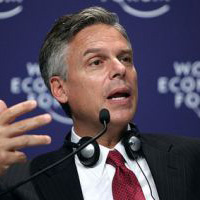 World Economic Forum/Flickr
World Economic Forum/Flickr
Jon Huntsman’s New Campaign Strategy? Smack Talk
Before Monday night’s CNN/Tea Party Express debate, Jon Huntsman’s campaign staff must have advised him to ditch the remaining scraps of his strict “civility” code and get his pugilism goin’.
Continuing his recent habit of criticizing fellow Republican contenders—including Mitt Romney for his job creation record, or Rick Perry for his feeble grasp on reality—Huntsman spent a significant chunk of his stage time during the debate attacking the other candidates.
The former Utah governor kicked things off by tossing out an awkward shout-out to the rock band Nirvana, mocking Mitt Romney’s book, No Apology: The Case for American Greatness, by saying it sounded like a “Kurt Cobain reference.” Unfortunately for Huntsman, half-hearted grunge-rock humor doesn’t exactly fire up tea party crowds. (In Huntsman’s defense, his joke was only off by one word.)
Later in the evening, Huntsman set his sights on Texas Gov. Rick Perry, arguing that, “For Rick to say you can’t secure the border is pretty much a treasonous comment.” Though immigration was the topic, this possibly doubled as a tongue-in-cheek reference to Perry’s controversial indictment of Ben Bernanke in mid-August.
Later, Huntsman went back to taking potshots at Romney, this time reminding the tea party spectators (who aren’t particularly fond of Romney in the first place) about the former Massachusetts governor’s propensity for flip-flopping: “I think we could spend all night talking about where Mitt has been on the issues, and that would take forever!”
Huntsman, who cannot seem to get out of the low single-digits in the polls, seems to have developed a new strategy for attracting much-needed attention from the electorate: Hurl a lot of criticisms at the screen and see what sticks.
But all Huntsman’s attacks drew either crickets or muffled boos from the Tea Party audience. Will there be big difference in Huntsman’s numbers come morning? Don’t count on it.
